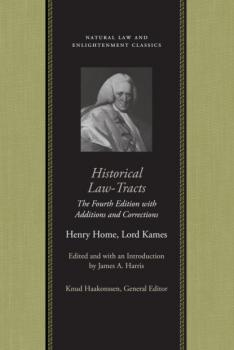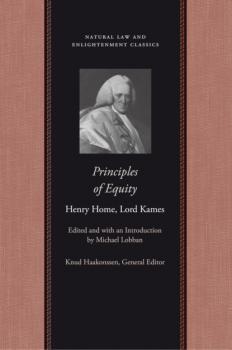Henry Home, Lord Kames
Список книг автора Henry Home, Lord KamesHistorical Law-Tracts
Historical Law-Tracts is one of the earliest contributions to the Scottish Enlightenment project of a historical science of society. Henry Home, Lord Kames (1696–1782), was an influential Scottish juEAe, a prolific man of letters, and one of the leading figures of the Enlightenment in Scotland, and his goal in this work is to show the study of law as a genuinely scientific inquiry and not a mere collection of facts for the lawyer to memorize. He deployed a large range of ancient, medieval, and early-modern sources to trace the development of law and to explain that development in terms of interactions between principles of human nature and political, economic, and social circumstance. He applied this method in substantial and influential treatments of criminal law and the law of property and also to a diverse range of issues, specifically in Scots law. One of Kames’s principal objectives was to expose and discredit the continuing influence of feudal principles in eighteenth-century Scots law and, as such, Historical Law-Tracts can be read as a manifesto for a modern, commercial, Scotland. The work found an international readership as well, especially in America, where it was read as an object lesson in understanding the role of law in a free society.In Historical Law-Tracts, Kames combined the natural law framework that underlies his Essays on the Principles of Morality and Natural Religion with the “conjectural,” or philosophical, approach to history that would receive its fullest treatment in his Sketches of the History of Man to offer a history of law as a history of the progress of mankind from savage to civil society.The Liberty Fund edition supplements Kames’s original text with a new introduction providing historical context and biographical information, expansion of Kames’s footnotes to explain the often rather obscure system of reference used in the book, translation of the Latin passages, and explanatory annotations relating to important changes that Kames made to the text, including variant readings from earlier editions.James A. Harris is Professor of the History of Philosophy at the University of St. Andrews, Scotland. He is the author of Hume: An Intellectual Biography and Of Liberty and Necessity: The Free Will Debate in Eighteenth-Century British Philosophy. He is the editor of the Liberty Fund edition of Kames’s Sketches of the History of Man.
Principles of Equity
Henry Home, Lord Kames, was the complete “Enlightenment man,” concerned with the full spectrum of human knowleEAe and its social use. However, as a lawyer and, after 1752, as a juEAe on the Court of Session in Edinburgh, he made many of his most distinctive contributions through his works on the nature of law and legal development.Principles of Equity, first published in 1760, is considered his most lasting contribution to jurisprudence and is still cited. In his jurisprudence, Kames specifically sought to explain the distinction between the nature of equity and common law and to address related questions, such as whether equity should be bound by rules and whether there should be separate courts of law and equity.Beginning with a general introduction on the rise and nature of equity, Principles of Equity is divided into three books. The first two, “theoretical,” books examine the powers of a court of equity as derived from justice and from utility, the two great principles Kames felt governed equity. The third book aims to be more practical, showing the application of these powers to several subjects, such as bankrupts. Kames drew his illustrations of the principles of equity from the case law of the Court of Session as well as the English Chancery, both because he felt that the rules of equity must be the same in every country where law was cultivated, and because he hoped his work might promote a closer union between the law of the two kingdoms. Principles of Equityis significant as an example of the approach of an Enlightenment thinker to practical legal questions and as an early attempt to reduce law to principles. Kames himself saw this as his most important work, and scholars both of his theory and of the broader Scottish Enlightenment will find it gives essential insights into the thought of this central figure. There is evidence that this book was well known in the formative years of the United States and that both Benjamin Franklin and Thomas Jefferson were familiar with Kames’s treatise.Henry Home, Lord Kames (1696–1762) was one of the leaders of the Scottish Enlightenment.Michael Lobban is Professor of Legal History at Queen Mary, University of London. Please note: This title is available as an ebook for purchase on Amazon, Barnes and Noble, and iTunes.
Elements of Criticism
Elements of Criticism is Kames’s most influential work. When it first appeared, in 1762, it was the most comprehensive philosophical work on “criticism” in English, and it was published in five editions during Kames’s lifetime and another forty editions over the next century. In America, Elements of Criticism served as a standard text for college students of English.Liberty Fund’s edition of Elements of Criticism is the first modern edition of one of Kames’s most influential works. In Elements, Kames sets out his argument that the “science of criticism” is a “rational science;” it is “a subject of reasoning as well as of taste.” Volume one explores the nature and causes of the emotions and passions. Volume two delineates principles of rhetoric and literary appreciation, ending with a discussion of the formation of a standard of taste. Kames illustrated both volumes with a vast range of examples from classical literature and the arts of his own day.Henry Home, Lord Kames (1696–1782) was one of the leaders of the Scottish Enlightenment.Peter Jones is Professor Emeritus of Philosophy at the University of Edinburgh. Please note: This title is available as an ebook for purchase on Amazon, Barnes and Noble, and iTunes.


